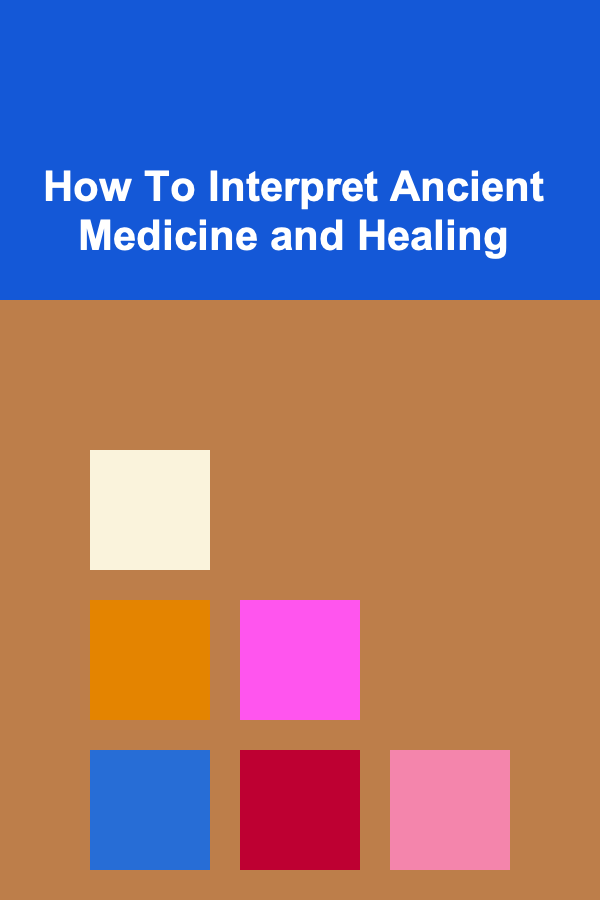
How To Interpret Ancient Medicine and Healing
ebook include PDF & Audio bundle (Micro Guide)
$12.99$7.99
Limited Time Offer! Order within the next:

Ancient medicine and healing practices have long been a topic of fascination, blending profound philosophies with practical applications that have influenced medical practices worldwide. From the mystical herbs of ancient Egypt to the complex acupuncture techniques of traditional Chinese medicine, these ancient systems offer valuable insights into the understanding of health, wellness, and disease prevention. Interpreting ancient medicine, however, requires more than just decoding historical texts; it involves a deep appreciation of the cultural, spiritual, and philosophical contexts that gave rise to these practices.
In this article, we will explore how ancient medical systems were developed, their interpretations, and the relevance of these practices in modern medicine. Through a multi-faceted approach, we will delve into different methods of ancient healing, analyze how they align with or contrast modern scientific understanding, and discuss their possible applications in today's world.
Understanding Ancient Medicine
Ancient medicine is not merely a collection of early treatments and remedies. It is an intricate system of thought that integrates health, spirituality, and philosophy. Across various cultures, medicine was closely tied to belief systems and a holistic view of the human body, which was often seen as a microcosm of the universe. Thus, understanding ancient medicine requires recognizing the philosophy behind each practice, as well as the local environment, culture, and societal needs that shaped its evolution.
Egyptian Medicine: A Blend of Magic and Practicality
Ancient Egypt's approach to medicine was notably pragmatic yet interwoven with spirituality. Egyptian healers combined practical knowledge of anatomy with divine beliefs. They saw illness as a disruption of cosmic order and, therefore, treatments often included not only herbal remedies and surgical procedures but also magical incantations, prayers, and rituals to appease gods or evil spirits. The Egyptian "Papyrus Ebers," a medical text dating back to 1550 BCE, offers a glimpse into this complex healing system. It includes prescriptions for various ailments, from wounds and infections to mental health conditions, demonstrating their understanding of basic anatomical functions and the medicinal properties of plants.
However, the Egyptians' medical wisdom was not entirely based on empiricism. The use of charms, spells, and incantations was a common feature in treatments, reflecting their belief in the influence of gods over human health. The blending of practical medicine with religious and magical elements in Egyptian healing practices reveals a unique cultural approach that sought to balance the physical and spiritual dimensions of health.
Traditional Chinese Medicine: Balance and Harmony
Traditional Chinese Medicine (TCM) is one of the most enduring and comprehensive ancient medical systems. Rooted in the concept of yin and yang and the flow of qi (vital energy), TCM emphasizes balance and harmony within the body and between the body and the environment. TCM practitioners believe that illness arises when the flow of qi is disrupted, leading to an imbalance between opposing forces such as yin and yang. This framework is used to diagnose, prevent, and treat illnesses by promoting the restoration of balance.
Key to TCM are modalities like acupuncture, herbal medicine, dietary therapy, and qigong. Acupuncture, for instance, involves inserting fine needles into specific points along the body's meridians to restore the flow of qi. While the precise mechanism remains an area of scientific investigation, clinical studies have shown that acupuncture can be effective for treating pain, nausea, and certain chronic conditions.
TCM also advocates for preventative care through the regulation of lifestyle, diet, and emotions. According to TCM principles, maintaining a balanced diet and emotional equilibrium is essential for sustaining health, as they directly influence the body's internal energy and overall vitality.
Greek Medicine: Rational Thought and the Humors
Greek medicine, especially the theories developed by Hippocrates and Galen, introduced a more empirical approach to healing. The famous Hippocratic Oath, still relevant to modern medical practice, emphasizes ethics, observation, and patient care. Hippocrates posited that disease was not caused by gods or supernatural forces but by imbalances in the body's humors: blood, phlegm, black bile, and yellow bile.
Each humor was thought to correspond to certain bodily functions and characteristics. The balance of these humors was considered crucial for health, and illnesses were seen as the result of an excess or deficiency in one or more of them. While the humoral theory is no longer accepted in modern medicine, its emphasis on observation and rational thinking laid the groundwork for the scientific method.
Hippocrates also advanced the concept of diet and lifestyle as fundamental to health, promoting regular exercise, good hygiene, and a balanced diet as means of preventing disease. These ideas, though ancient, have seen a resurgence in contemporary wellness movements, which focus on holistic health and preventative care.
Ayurveda: The Science of Life
Ayurveda, an ancient system of medicine originating in India, has been practiced for over 5,000 years. At its core, Ayurveda seeks to achieve balance between the body, mind, and spirit. It is based on the concept of the five elements (earth, water, fire, air, and ether) and the three doshas (vata, pitta, and kapha), which are believed to govern the physiological and psychological functions of the body.
Ayurvedic treatments are highly individualized and depend on a person's dosha, lifestyle, and environmental factors. These treatments often involve dietary recommendations, herbal remedies, meditation, yoga, and cleansing therapies like panchakarma. Ayurvedic medicine places a strong emphasis on prevention, using personalized health plans to maintain balance and promote longevity.
Though Ayurveda is deeply rooted in spirituality, it is also supported by empirical observations. Modern research has begun to validate the effectiveness of Ayurvedic herbs and practices in treating various ailments, particularly in the areas of digestive health, stress reduction, and chronic conditions like arthritis.
Native American Healing: A Connection to Nature
Native American healing practices are highly diverse and vary among different tribes and regions. However, a common thread among most Native American healing traditions is the deep connection to nature and the belief in spiritual forces that influence health. Healing practices often include the use of plants, rituals, and ceremonies to restore harmony within the individual and the community.
For example, the use of sage and sweetgrass in purification rituals is believed to cleanse the body and spirit, removing negative energy and promoting healing. Shamanic practices, where spiritual leaders communicate with the spirit world, also play a key role in healing. These rituals often include drumming, chanting, and dances to facilitate emotional and spiritual healing.
Native American medicine emphasizes the importance of community, with a holistic view that incorporates not only physical health but also emotional, spiritual, and social well-being. This perspective aligns with modern understandings of the mind-body connection and the importance of social support in health outcomes.
Interpreting Ancient Medicine in the Modern World
Interpreting ancient medicine in the context of modern health and wellness requires both respect for the historical context in which these practices developed and an open mind to their potential applications today. While many of these systems are rooted in spiritual or mystical beliefs, they also offer valuable insights into maintaining health through balance, prevention, and holistic care.
In the modern world, we often focus on treating illness rather than preventing it. Ancient medical systems, however, place a significant emphasis on prevention through lifestyle, diet, and maintaining balance within the body. This perspective is gaining traction in today's wellness culture, where there is growing recognition of the importance of preventive health practices such as yoga, meditation, and mindful eating.
Additionally, many ancient practices are being revisited by modern science. For example, acupuncture has been studied for its effects on pain management, and Ayurvedic herbs have shown promise in treating conditions like inflammation and anxiety. The growing field of integrative medicine seeks to blend the best of ancient healing systems with modern medical knowledge to provide comprehensive care that addresses both the physical and mental aspects of health.
Challenges and Limitations in Interpreting Ancient Healing
Despite their potential benefits, ancient medical systems must be approached with caution. Not all treatments that were used in ancient times are safe or effective by modern standards. Some remedies may have been based on incorrect assumptions, and the lack of scientific testing or standardization means that their safety and efficacy cannot always be guaranteed.
Moreover, ancient practices were often developed within specific cultural contexts that may not be directly applicable to modern, globalized societies. While the holistic, preventive approach of ancient medicine may offer valuable insights, it must be adapted to contemporary medical and scientific standards.
Finally, interpreting ancient medicine through a modern lens requires careful consideration of the cultural and spiritual elements that shaped these practices. Many ancient medical systems view health as a holistic process, where the mind, body, and spirit are interconnected. In contrast, modern medicine tends to prioritize physical health and often overlooks the spiritual or emotional aspects of well-being.
Conclusion
Ancient medicine and healing practices provide a window into the past, revealing how different cultures have understood and approached health and wellness. These practices, though deeply intertwined with spiritual beliefs, offer valuable lessons about balance, prevention, and the integration of mind and body. By interpreting ancient healing systems with respect and openness, we can gain new perspectives on health and well-being that complement modern medical practices.
In today's world, where chronic diseases, stress, and environmental factors are increasingly affecting our health, returning to some of these ancient principles may provide valuable guidance. Whether through the use of herbal remedies, meditation, or a more holistic approach to healing, there is much that ancient medicine can teach us about living a healthy, balanced life in the modern world.
While we may not be able to adopt all ancient practices wholesale, we can continue to learn from the wisdom of the past, blending it with contemporary knowledge to create a more comprehensive and effective approach to health and healing.
Other Products

How to Create DIY Craft Projects for Family Bonding
Read More
How to Keep Your Home Safe by Monitoring Visitors and Deliveries
Read More
How to Market Your Rental Property to Potential Tenants
Read More
How to Use Baskets and Bins for a Tidy Apartment
Read More
How to Use Security Signs and Stickers to Deter Crime
Read More